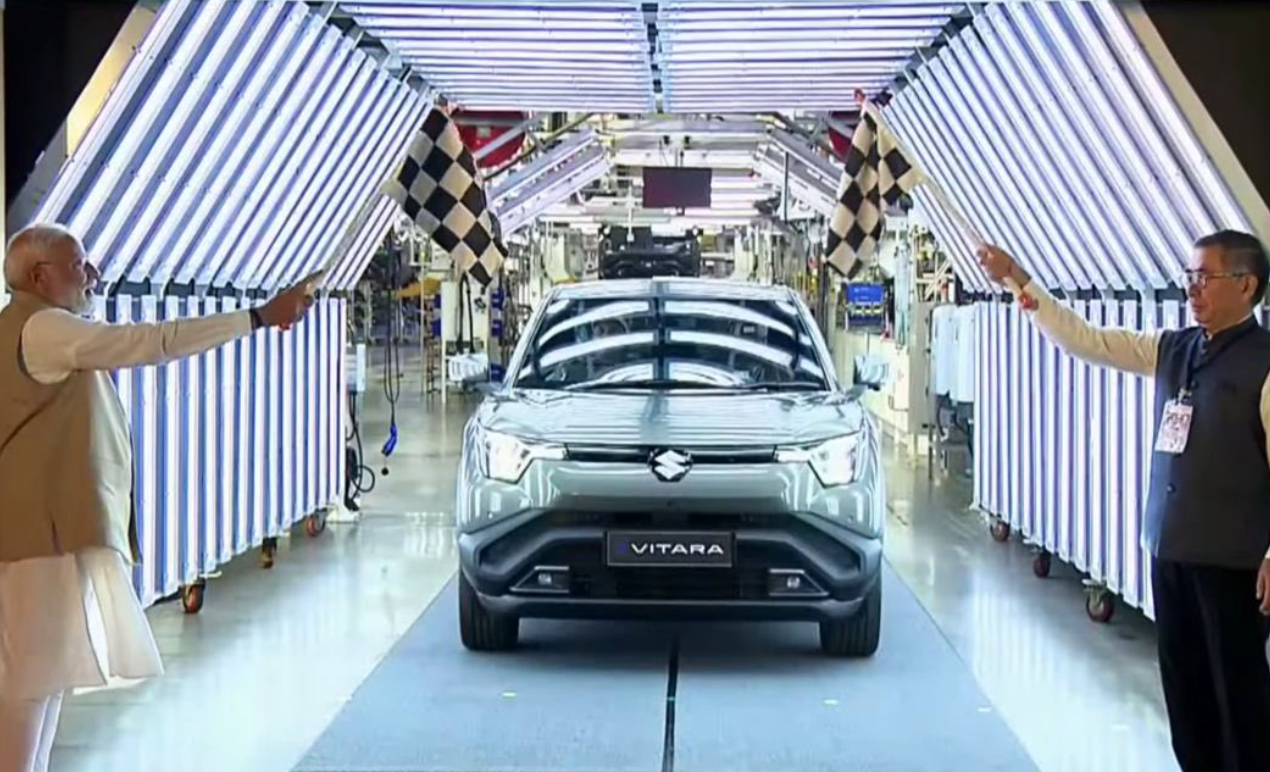
Maruti Suzuki, India’s largest carmaker, has taken a historic step in its journey toward green mobility with the launch of its first battery electric vehicle (BEV), the eVitara. On August 26, 2025, Prime Minister Narendra Modi inaugurated the production and flagged off the first export consignment of the eVitara at the Suzuki Motor Gujarat plant in Hansalpur, Ahmedabad. The occasion also marked the beginning of global exports to more than 100 countries, including advanced markets such as Japan and Europe.
The launch positions India as Suzuki’s global hub for electric vehicle production, a milestone that not only strengthens India’s manufacturing capabilities but also accelerates the nation’s transition toward clean energy and self-reliance. Alongside this, PM Modi also inaugurated a new lithium-ion battery and electrode production facility, cementing India’s growing EV ecosystem.
Production and Investment
Maruti Suzuki has earmarked the Hansalpur plant in Gujarat as the center of its EV strategy. For FY26, the company plans to manufacture 70,000 units of the eVitara, out of its total annual production capacity of 2.6 million units across four Indian plants. A significant share of these vehicles will be exported, starting with the United Kingdom and later expanding to other European markets.

The company has invested Rs 2,100 crore in developing its maiden electric vehicle, signaling a clear shift in its long-term strategy toward electric mobility. This investment is part of Suzuki’s larger vision of using India as its global manufacturing base for EVs, the first time a global automotive leader has designated India as its international hub for electric vehicles.
eVitara Specifications and Features
The eVitara comes with two battery options: a 48.8 kWh unit delivering a 346 km WLTP-certified range, and a 61.1 kWh unit offering up to 428 km in the single-motor variant and 412 km in the dual-motor version. Under ideal conditions, Maruti Suzuki claims the vehicle can deliver close to 500 km of range, making it a strong competitor for both city driving and long-distance journeys.
Three trims will be available: Delta, Zeta, and Alpha, with ten color options. These include single-tone shades such as Opulent Red, Bluish Black, Arctic White, Splendid Silver, Grandeur Grey, and Nexa Blue, along with dual-tone variants like Arctic White with a black roof or Opulent Red with a black roof.
The SUV is equipped with premium features such as a dual-tone brown-and-black interior, a 10.1-inch infotainment display, a 10.25-inch digital instrument cluster, ventilated front seats, a fixed glass roof, reclining and sliding rear seats, and advanced safety features. It also offers Level-2 Advanced Driver Assistance Systems (ADAS), a 360-degree camera, and seven airbags.
With an expected starting price of around ₹20 lakh (ex-showroom), the eVitara will compete against models like the Mahindra BE.05, Hyundai Creta Electric, MG ZS EV, and Tata Curvv EV, placing it firmly in the premium mass-market segment.
Global Export Strategy
One of the highlights of the launch is Maruti Suzuki’s export-first approach. The eVitara will be exported to over 100 countries, including mature EV markets such as Japan and Europe. Initial shipments will head to the United Kingdom.
In FY25, Maruti Suzuki exported 3.32 lakh vehicles, while its domestic sales stood at 19.01 lakh units, underlining its strong global presence. The company aims to leverage India’s cost efficiencies and skilled workforce to make the Hansalpur plant a key global supply hub.
The Gujarat facility is backed by strong logistics infrastructure, including a Gati Shakti Multimodal Cargo Terminal that can dispatch up to 3 lakh vehicles annually through rail to ports such as Mundra for overseas shipments. Dedicated railway wagons like BCACBM, ACT1, and ACT2 have been deployed to ensure cost-effective and efficient transport of electric vehicles.
Strengthening the Battery Ecosystem
PM Modi also inaugurated the localized production of hybrid battery electrodes at the TDS Lithium-Ion Battery plant, a joint venture between Toshiba, Denso, and Suzuki. With over 80% of the battery value chain now being manufactured in India, this development reduces import dependency and enhances domestic capacity for both EVs and strong hybrid electric vehicles (SHEVs).
The initiative lowers production costs, promotes self-reliance, and contributes to India’s Make in India and Aatmanirbhar Bharat goals. It also enhances the country’s role in the global clean energy supply chain.
Economic and Strategic Impact
The Prime Minister called the launch a “special day for India’s quest for self-reliance and green mobility.” The Gujarat facility is expected to generate significant local employment, boost ancillary industries, and strengthen the supplier ecosystem.
India’s competitive advantage lies in its low electricity costs, at ₹7-8 per kWh, which is one-third of Japan’s rates. This makes EV production more viable and reduces running costs for consumers. The nation’s automobile exports have grown from ₹50,000 crore in 2014 to ₹1.2 lakh crore in recent years, and the eVitara’s global rollout is expected to further accelerate this growth.
Maruti Suzuki’s EV Roadmap
Maruti Suzuki plans to launch six BEVs by FY31, with EVs accounting for 15–20% of its total sales by the end of the decade. The company is also working on expanding EV charging networks across India’s top 100 cities and exploring battery-as-a-service (BaaS) models to tackle concerns of range anxiety and high upfront costs.
The eVitara was first showcased at the Bharat Mobility Global Expo in January 2025, where it received strong attention as Maruti Suzuki’s entry into the EV space. Though the company is a late entrant to the segment, its brand trust, vast service network, and aggressive export strategy position it strongly to become India’s leading EV manufacturer within a short span.
Government support, including the Production Linked Incentive (PLI) scheme and large-scale infrastructure investments such as the ₹1,400 crore Mahesana-Palanpur railway line doubling project, are expected to provide further momentum to Maruti Suzuki’s EV journey.
The launch of the eVitara is more than just a product introduction. It marks a turning point for India’s automobile industry, making the country a central hub in the global electric mobility transition while creating economic opportunities and supporting the shift toward a sustainable future.




